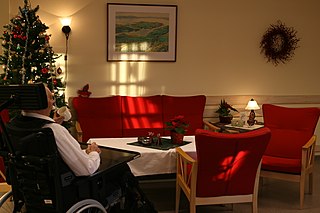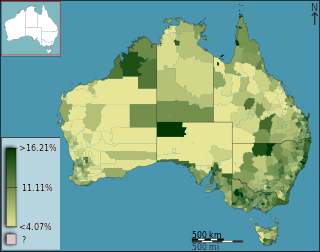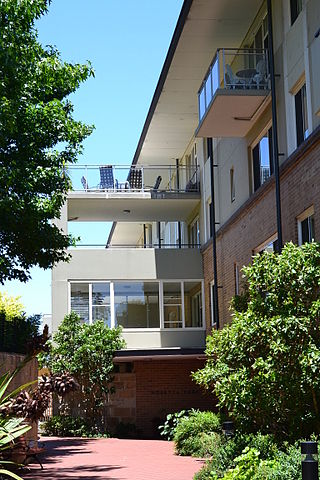Queensland Community Care Network Inc. (QCCN) is a charity organisation based in Queensland, Australia. QCCN was established in June 1990 to provide broad-based community services directly to people requiring some level of community or home support.
QCCN acknowledges that the personal care of the elderly can become a source of stress to both the person involved and their carers. Preservation of the health and well being of elderly people is the key to preventing premature or inappropriate institutionalisation. QCCN helps to assist people to maintain a normal lifestyle.
QCCN contributes to two main programs to help elderly Australians, the "Aged Care Volunteer Visitors Scheme" and the "100+ Club".
The Aged Care Volunteer Visitors Scheme (ACVVS) is an initiative of the Australian Federal Government, managed by the Department of Health (Australia). The target group of the ACVVS is isolated residents of the ageing population whose quality of life would be improved by the friendship and companionship achieved by having volunteers visit them on a one-to-one basis.
Since 1990 Queensland Community Care Network along with a number of other organisations has been funded to manage the Aged Care Volunteer Visitors Scheme in Queensland.
The 100+ Club was formed in 1993 and is the only known club of its type in the world. It is an exclusive club available on a non-religious, non-racial, non-class basis – the only condition of membership is that a person be aged 100 years or older. The Current Premier of Queensland is the patron of the 100+ Club. [1] [2]
The club was formed by the Queensland Community Care Network to highlight one of the unique aspects of ageing – the large number of people aged 100 years or over. During the QCCN’s work in aged care facilities in Queensland, large numbers of people aged 100 years and older were identified, many with few peers to reminisce with.
These rare and unique people were largely isolated in age care facilities, frequently with no social activities, despite having good general health. Many of them felt, because of their isolation, that they were alone as centenarians. The objectives of the first functions put together on behalf of the 100+ Club was to improve their quality of life and to give them an opportunity to mix with people. Today, the 100+ Club solely exists to provide centenarians with people their own age to socialise with.
A nursing home is a facility for the residential care of older people, senior citizens, or disabled people. Nursing homes may also be referred to as care homes, skilled nursing facilities (SNF) or long-term care facilities. Often, these terms have slightly different meanings to indicate whether the institutions are public or private, and whether they provide mostly assisted living, or nursing care and emergency medical care. Nursing homes are used by people who do not need to be in a hospital, but require care that is hard to provide in a home setting. The nursing home staff attends to the patients' medical and other needs. Most nursing homes have nursing aides and skilled nurses on hand 24 hours a day.

Geriatrics, or geriatric medicine, is a medical specialty focused on providing care for the unique health needs of the elderly. The term geriatrics originates from the Greek γέρων geron meaning "old man", and ιατρός iatros meaning "healer". It aims to promote health by preventing, diagnosing and treating disease in older adults. There is no defined age at which patients may be under the care of a geriatrician, or geriatric physician, a physician who specializes in the care of older people. Rather, this decision is guided by individual patient need and the caregiving structures available to them. This care may benefit those who are managing multiple chronic conditions or experiencing significant age-related complications that threaten quality of daily life. Geriatric care may be indicated if caregiving responsibilities become increasingly stressful or medically complex for family and caregivers to manage independently.

Elderly care, or simply eldercare, serves the needs of old adults. It encompasses assisted living, adult daycare, long-term care, nursing homes, hospice care, and home care.

Meals on Wheels is a program that delivers meals to individuals at home who are unable to purchase or prepare their own meals. The name is often used generically to refer to home-delivered meals programs, not all of which are actually named "Meals on Wheels". Many of the housebound recipients are the elderly, and many of the volunteers are also elderly but able-bodied and able to drive automobiles.

Geriatric dentistry is the delivery of dental care to older adults involving diagnosis, prevention, management and treatment of problems associated with age related diseases. The mouth is referred to as a mirror of overall health, reinforcing that oral health is an integral part of general health. In the elderly population poor oral health has been considered a risk factor for general health problems. Older adults are more susceptible to oral conditions or diseases due to an increase in chronic conditions and physical/mental disabilities. Thus, the elderly form a distinct group in terms of provision of care.

An adult daycare center is typically a non-residential facility that supports the health, nutritional, social, and daily living needs of adults in a professionally staffed, group setting. These facilities provide adults with transitional care and short-term rehabilitation following hospital discharge. The majority of centers provide meals, meaningful activities, and general supervision. The care provided is often a social model or a medical model provided in order to improve participants health and guide their progress in the right direction. Demand for adult daycare centers is increasing with the need for assistance in old age or guidance to reintegrate into society after injury, illness or addiction, and accommodation to return to their former lives or improve upon their quality of life.
Gerontechnology, also called gerotechnology is an inter- and multidisciplinary academic as well as a professional field that combines various disciplines of gerontology and technology. Sustainability of an aging society depends upon our effectiveness in creating technological environments, including assistive technology and inclusive design, for innovative and independent living and social participation of older adults in any state of health, comfort as well as safety. In short, gerontechnology concerns matching technological environments to health, housing, mobility, communication, leisure, work and also the personality/individual dispositions of older people. Gerontechnology is most frequently identified as a subset of HealthTech and is -- since the 2010s -- more commonly referred to as AgeTech or Agetech in Europe and the United States. Research outcomes form the basis for designers, builders, engineers, manufacturers, and those in the health professions, to provide an optimum living environment for the widest range of ages.

Gerontological nursing is the specialty of nursing pertaining to older adults. Gerontological nurses work in collaboration with older adults, their families, and communities to support healthy aging, maximum functioning, and quality of life. The term gerontological nursing, which replaced the term geriatric nursing in the 1970s, is seen as being more consistent with the specialty's broader focus on health and wellness, in addition to illness.
Due to the near-universal desire for safe, effective, and high quality healthcare, there is a growing interest in international healthcare accreditation. Providing healthcare, especially of an adequate standard, is a complex and challenging process. Healthcare is a vital and pervasive issue; it influences all aspects of societies. It has medical, social, political, ethical, business, and financial ramifications. In any part of the world healthcare services can be provided either by the public sector or by the private sector, or by a combination of the two. Healthcare can be provided in hospitals or be accessed through practitioners working in the community, such as general medical practitioners and dental surgeons.
The Tipping Foundation is a not-for-profit community organisation based in Victoria, Australia. The Tipping Foundation merged with House with No Steps in 2018, and is now known as Aruma.

Health care in Australia operates under a shared public-private model underpinned by the Medicare system, the national single-payer funding model. State and territory governments operate public health facilities where eligible patients receive care free of charge. Primary health services, such as GP clinics, are privately owned in most situations, but attract Medicare rebates. Australian citizens, permanent residents, and some visitors and visa holders are eligible for health services under the Medicare system. Individuals are encouraged through tax surcharges to purchase health insurance to cover services offered in the private sector, and further fund health care.
Carers' rights are rights of unpaid carers or caregivers to public recognition and assistance in preventing and alleviating problems arising from caring for relatives or friends with disabilities. The carers' rights movement draws attention to issues of low income, social exclusion, damage to mental and physical health identified by research into unpaid caregiving. In social policy and campaigning the movement distinguishes such people's situation from that of paid careworkers, who in most developed countries have the benefit of legal employment protection and rights at work. With an increasingly ageing population in all developed societies, the role of carer has been increasingly recognized as an important one, both functionally and economically. Many organizations which provide support for persons with disabilities have developed various forms of support for carers/caregivers as well.

St. Luke's Hospital is a community hospital in Singapore that provides professional healthcare services. It was named after the patron saint of the medical profession, St. Luke. St. Luke's Hospital for the Elderly Sick was registered as a voluntary welfare organization in the Registry of Societies in October 1991. It was renamed St. Luke's Hospital in September 2004 to signify the hospital's role as a community hospital while retaining its focus on geriatric care. The idea of setting up a community hospital was first mooted by a group of Christian doctors and nurses after a report from the Advisory Council on the Aged in 1988 raised important issues concerning the lack of adequate elderly care facilities in Singapore. A projection of the number of facilities and resources needed to provide adequate healthcare services to Singapore's aging population in 2030 revealed serious shortfalls. In response to the problem of inadequate healthcare facilities for the elderly, a group of 8 churches and Christian organizations including the Graduate Christian Fellowship and the Singapore Nurses' Christian Fellowship, came together to set up St. Luke's Hospital for the Elderly Sick. St. Luke's Hospital is headed by a board of directors and various committees that oversee the daily operations of the hospital.
The rights of older persons are the entitlements and independence claimed for senior citizens. Elderly rights are one of the fundamental rights of India. The International Day of older persons is celebrated annually on October 1.
Sacred Heart Mission in St Kilda, an inner suburb of Melbourne, is a medium-sized not-for-profit organisation that grew from the Catholic parish of The Sacred Heart in Grey Street, West St Kilda. It addresses homelessness, social exclusion and disadvantage by providing a range of diverse and creative services that:
Caregiving by country is the regional variation of caregiving practices as distinguished among countries.
Research into food preferences in older adults and seniors considers how people's dietary experiences change with ageing, and helps people understand how taste, nutrition, and food choices can change throughout one's lifetime, particularly when people approach the age of 70 or beyond. Influencing variables can include: social and cultural environment, gender and/or personal habits, and also physical and mental health. Scientific studies have been performed to explain why people like or dislike certain foods and what factors may affect these preferences.

LGBT ageing addresses issues and concerns related to the ageing of lesbian, gay, bisexual and transgender (LGBT) people. Older LGBT people are marginalised by: a) younger LGBT people, because of ageism; and b) by older age social networks because of homophobia, biphobia, transphobia, heteronormativity, heterosexism, prejudice and discrimination towards LGBT people.

Aged care in Australia, is the provision of services to meet the unique needs of older people in Australia. It includes both residential aged care as well as services provided in the home such as personal care, domestic assistance, home nursing, nutrition and meal preparation, respite services, continence management, mobility & dexterity assistance, transport, social support and the provision of equipment and aids.
Sydney Community Services (SCS) is a not-for-profit community services organisation based in the Lane Cove and Hunters Hill local government areas in Sydney, New South Wales.